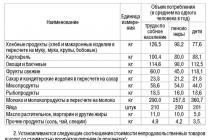Federal tax office <…>regarding income tax individuals payment made to an employee of the organization upon dismissal by agreement of the parties, reports the following.
On January 1, 2012, a new version of paragraph 3 of Article 217 came into force tax code Russian Federation (hereinafter referred to as the Code), in accordance with which compensation payments established by law are exempt from personal income tax Russian Federation related to the dismissal of employees, in the form of severance pay, average monthly earnings for the period of employment, compensation to the head, deputy heads and chief accountant of the organization in the part not exceeding in general three times the average monthly salary or six times the average monthly salary for employees dismissed from organizations located in the regions of the Far North and equivalent areas.
These changes have been made federal law dated November 21, 2011 No. 330-FZ "On Amending Part Two of the Tax Code of the Russian Federation, Article 15 of the Law of the Russian Federation "On the Status of Judges in the Russian Federation" and Recognizing Certain Provisions of Legislative Acts of the Russian Federation as Invalid".
In this way, payments made from January 1, 2012 to an employee of the organization upon dismissal, including severance pay and average monthly earnings for the period of employment, are exempted from personal income tax in an amount not exceeding a total of three times the average monthly earnings (six times the average monthly earnings for employees dismissed from organizations located in the regions of the Extreme North and equated areas).
Said provisions paragraph 3 of Article 217 of the Code apply regardless of the position held by the employees of the organization, as well as the grounds on which the dismissal is made.
In accordance with paragraph 1 of Article 231 of the Code, excessively withheld tax agent from the income of the taxpayer, the amount of tax is subject to return by the tax agent on the basis of a written application of the taxpayer.
Acting State Councilor of the Russian Federation III class D.V. Egorov
Expert comment
Personal income tax: payments made upon dismissal by agreement of the parties
- severance pay;
- average monthly earnings for the period of employment.
Federal Law No. 330-FZ dated November 21, 2011, subparagraph 3 of paragraph 1 of Article 217 of the Tax Code of the Russian Federation was supplemented by a new eighth paragraph. It talks about tax exemption personal income tax amounts payments in the form of severance pay, average monthly earnings for the period of employment, compensation to the head (his deputies) and the chief accountant of the organization in the part not exceeding a total of three times the average monthly earnings (six times the average monthly earnings for employees dismissed from organizations located in regions of the Far North and equivalent areas). This rule has been in effect since January 1, 2012.
It is not clear from the wording of the new paragraph which laid-off workers should be paid severance pay and average monthly earnings for the period of employment in order for such sums of money were not subject to personal income tax: the head (his deputies) and the chief accountant or each employee of the organization? If for each employee, then in what amount: in full, or in the specified part? What is the reason for the dismissal?
According to the clarifications of the Federal Tax Service of Russia in the commented letter, the provisions of paragraph 3 of Article 217 of the Tax Code of the Russian Federation apply regardless from position employees of the organization, and also regardless of grounds, according to which dismissal. Payments made from January 1, 2012 to an employee of an organization upon dismissal, including severance pay and average monthly earnings for the period of employment, are exempt from personal income tax in certain amount. It must not exceed generally three times the average monthly salary (six times the average monthly salary for employees laid off from organizations located in the Far North and equivalent areas).
About retirement benefits
The employer pays the dismissed employee:
- wages for the days worked in the month of dismissal;
- compensation for unused vacation(Article 127 of the Labor Code of the Russian Federation);
- severance pay (Articles 178, 296, 318 of the Labor Code of the Russian Federation);
- average earnings saved for the duration of employment (Articles 178, 318 of the Labor Code of the Russian Federation).
Upon termination employment contract payment of all amounts due to the employee from the employer, including compensation upon dismissal, are made on the last day of work. This follows from parts 3 and 4 of article 84.1 of the Labor Code of the Russian Federation.
If the set day coincided with a weekend or non-working holiday, then payments upon dismissal are made on the eve of this day.
Compensation for unused vacation
Upon dismissal, the employee is paid monetary compensation for all unused vacations.
At the written request of the employee, unused vacations may be granted to him with subsequent dismissal (with the exception of cases of dismissal for guilty actions). The day of dismissal will be considered the last day of vacation.
The amount of compensation is calculated by multiplying the number of days of unused vacation of the employee by his average daily wage.
The number of days of unused vacation is determined in accordance with the Procedure for calculating compensation upon dismissal, specified in the Rules on regular and additional vacations. They were approved by the Decree of the NCT of the USSR dated April 30, 1930 No. 169.
The average daily wage is determined in accordance with Article 139 of the Labor Code of the Russian Federation. According to this article, it is calculated for the last 12 calendar months by dividing the amount of accrued wages by 12 and by 29.4 (average monthly number calendar days).
Severance pay upon dismissal can be paid in the amount of:
- two-week average earnings;
- monthly average earnings.
It all depends on the reason for the dismissal.
The employer must pay severance pay upon dismissal in the amount of two weeks' earnings if the dismissal occurred due to the following circumstances:
- refusal of the employee to transfer to another job, necessary for him in accordance with the medical report;
- conscription of an employee for military service;
- the reinstatement of another employee who previously performed this work;
- refusal of the employee to transfer to work in another area together with the employer.
Upon termination of an employment contract with an employee engaged in seasonal work, in connection with the liquidation of the organization, reduction in the number or staff, severance pay is paid in the amount of two weeks of average earnings (part 3 of article 296 of the Labor Code of the Russian Federation).
Severance pay upon dismissal in the amount of monthly average earnings is paid to an employee if:
- the employer organization is liquidated;
- reduction in the number of employees;
- the termination of the employment contract occurred due to a violation of the rules for its conclusion through no fault of the employee. In a situation where a violation of the rules of an employment contract is committed through the fault of an employee, he is not paid severance pay (part 3 of article 84 of the Labor Code of the Russian Federation).
Severance pay upon dismissal of employees with whom an employment contract has been concluded for a period of up to two months, as a rule, is not paid (part 3 of article 292 of the Labor Code of the Russian Federation).
Average earnings retained for the duration of employment
When terminating an employment contract due to the liquidation of an organization or a reduction in staff, the employee retains the average monthly salary for the period of employment, but not more than two months (including severance pay).
In exceptional cases, the average monthly salary is retained by the dismissed employee for the third month from the date of dismissal by decision of the body of the employment service. Provided that within two weeks after the dismissal, the employee applied to this body and was not employed by him.
An employee dismissed from an organization located in the regions of the Far North and areas equivalent to them, in connection with the liquidation of the organization or a reduction in the number or staff of employees, retains the average monthly salary for the period of employment, but not more than three months from the date of dismissal (including the day off benefits). In exceptional cases, the average monthly salary is retained by the specified employee for the fourth, fifth and sixth months from the date of dismissal by decision of the employment service body, provided that the employee applied to this body within a month after the dismissal and was not employed by him.
Reference: guarantees to the head of organizations, his deputies and the chief accountant in case of dismissal for special reasons (due to a change in the owner of the organization’s property, in the event of termination of the employment contract) are provided for in Articles 181 and 279 of the Labor Code of the Russian Federation.
Tax consultant O.L. Alekseeva
The Labor Code of the Russian Federation provides for several cases when, upon dismissal, an employee must be paid not only wages and, but also additional payments.
For example, when an organization is liquidated, as well as when the number or staff of a company is reduced (clause 1.2, article 81 of the Labor Code of the Russian Federation), the employee is paid a severance pay in the amount of the average monthly earnings, and for the period of employment - according to general rule no more than 2 months from the date of dismissal - he retains the average monthly salary (Article 178 of the Labor Code of the Russian Federation).
In addition to legislative established cases, the payment of severance pay may be provided for by labor or collective agreement, local normative act organizations, as well as a separate agreement with the employee (Art. 178, 181 of the Labor Code of the Russian Federation).
As a result, the question arises - is the severance pay subject to insurance premiums to the PFR, FFOMS and FSS, including "for injuries"?
The procedure for calculating insurance premiums from severance pay
The severance pay, as well as other compensations (except for) paid to the dismissed employee, are subject to taxation of contributions when their amount exceeds a certain limit (subparagraphs “d”, paragraph 2, part 1, article 9 of the Law of July 24, 2009 No. 212-FZ , paragraph 2, paragraph 1, article 20.2 of the Law of July 24, 1998 No. 125-FZ). The limits for different categories of employees are shown in the table below.
| What and to whom is paid upon dismissal | What is the amount of contributions |
|---|---|
| severance pay and average monthly earnings for the period of employment of an employee | |
| severance pay and average monthly earnings for the period of employment for an employee leaving an organization located in the Far North or equivalent areas | from an amount exceeding 6 times the average monthly salary of an employee |
| compensation to the head, deputy head, chief accountant | from an amount exceeding three times the average monthly salary of an employee |
Note that similar rules apply to the taxation of severance pay upon dismissal of personal income tax: the tax is calculated on amounts exceeding the above limits (
in an amount not exceeding in total
three average monthly earnings
All types established by the current legislation compensation payments related to dismissal (with the exception of compensation for unused vacation) are not subject to personal income tax (paragraph 6, clause 3, article 217 of the Tax Code of the Russian Federation).
From January 1, 2012, this rule states that the amounts of payments in the form of severance pay, average monthly earnings for the period of employment are subject to personal income tax in the part exceeding in aggregate three times the average monthly earnings. For employees of organizations located in the regions of the Far North and equivalent areas - six times the average monthly salary (paragraph 8, clause 3, article 217 of the Tax Code of the Russian Federation).
Recall that upon termination of an employment contract in connection with the liquidation of an organization, a reduction in the number or staff of employees, a dismissed employee is paid a severance pay in the amount of the average monthly salary (part 1 of article 178 of the Labor Code of the Russian Federation). At the same time, an increased amount of severance pay may be established by an employment or collective agreement (part 4 of article 178 of the Labor Code of the Russian Federation). Despite the fact that the labor legislation gives the employer the right to pay an increased severance pay, according to the regulatory authorities, only one average monthly salary is not subject to personal income tax (see Letter of the Federal Tax Service of Russia for Moscow dated 30.03.2011 N 20-14 / 3 / [email protected]). This is explained by the fact that, according to paragraph 3 of Art. 217 of the Tax Code of the Russian Federation, the exemption applies to compensation paid within the limits established in accordance with the law. And the Labor Code of the Russian Federation provides for a severance pay in the amount of one average monthly salary.
In connection with the entry into force of this amendment, employers have the following question: in what amount is the severance pay paid in an increased amount in accordance with the terms of an employment or collective agreement not subject to personal income tax? Two options are possible:
Severance pay paid in accordance with Part 1 of Art. 178 of the Labor Code of the Russian Federation, is not subject to personal income tax in the amount of one average monthly salary, that is, within the limits determined by labor legislation. After all, the condition of par. 1 p. 3 art. 217 of the Tax Code of the Russian Federation on exemption from taxation of compensation payments within the established norms continues to be valid after December 31, 2011;
This severance pay is not subject to personal income tax in the amount of three average monthly earnings (six - for organizations of the Far North). In favor of this point of view is the fact that from January 1, 2012 such a rule was established directly by par. 8 p. 3 art. 217 of the Tax Code of the Russian Federation.
It should be noted that in accordance with Part 1 of Art. 178 of the Labor Code of the Russian Federation, in addition to the severance pay, the employee also retains the average monthly salary for the period of employment, but not more than two months from the date of dismissal (with the severance pay offset). In exceptional cases, the average earnings are maintained for the third month (part 2 of article 178 of the Labor Code of the Russian Federation). According to Art. 318 of the Labor Code of the Russian Federation for employees of organizations located in the regions of the Far North and equivalent areas, as a general rule, average earnings are maintained for the period of employment, but not more than three months (in exceptional cases during the fourth, fifth and sixth months) from the date of dismissal. Thus, considering new edition paragraph 3 of Art. 217 of the Tax Code of the Russian Federation, it can be concluded that the aggregate of these payments in the amount of three (six) average monthly earnings, and not each payment separately, is exempt from personal income tax.
Explaining the innovations, the Ministry of Finance of Russia indicated that the provision of par. 8 p. 3 art. 217 of the Tax Code of the Russian Federation applies to the income of all employees of the organization, regardless of their position (Letters of the Ministry of Finance of Russia dated 08.21.2012 N 03-04-05 / 1-982, dated 07.31.2012 N 03-04-05 / 1-901, N 03 -04-05/1-903 , N 03-04-06/1-209 , dated 05/30/2012 N 03-04-05/1-664 , dated 03/26/2012 N 03-04-05/6-368 , dated 03/26/2012 N 03-04-06 / 6-72 , dated 02/21/2012 N 03-04-05 / 6-199 , dated 02/13/2012 N 03-04-06 / 6-34 , Federal Tax Service of Russia dated 09.13. 2012 N AS-4-3/ [email protected]), as well as regardless of the basis on which the termination of the employment contract occurs (Letters dated 08/13/2012 N 03-04-06 / 6-236, dated 06/28/2012 N 03-04-06 / 6-182, dated 04/11/2012 N 03-04-05/6-489, dated 04/10/2012 N 03-04-06/6-105, dated 04/02/2012 N 03-04-06/6-86). See also Letters of the Ministry of Finance of Russia No. 03-04-06/6-255 dated August 22, 2012, No. 03-04-06/1-239 dated August 13, 2012, No. 03-04-05/1-900 dated July 31, 2012 , dated 07/04/2012 N 03-04-06/1-198 , dated 06/29/2012 N 03-04-06/6-185 , dated 06/27/2012 N 03-04-06/6-181 , dated 06/06/2012 N 03-04-06 / 6-152, dated 05/18/2012 N 03-04-06 / 6-139.
of the Labor Code, do not fall into the taxable base for personal income tax, since they are recognized as established by the current labor legislation. The employer is obliged to make such payments regardless of the terms of the employment contract or other agreement, local regulatory act. The increased amount of payments Do not fall under the benefit of paragraph 3 of Art. 217 of the Tax Code, payments that are provided for by a collective agreement, a local regulation, an employment contract, in excess of the norms established by the current legislation. In excess of the amounts established by applicable law, payments are subject to personal income tax. What amounts to compare For purposes personal income tax calculations it is necessary to compare the total amount of severance pay and average earnings for the period of employment, accrued to the employee in the actual (increased) amount, and a similar indicator calculated in full accordance with the norms of Part 1 of Art.
Severance pay: insurance premiums
Law N 212-FZ objects of taxation of insurance premiums for organizations are payments and other remuneration accrued by payers of insurance premiums in favor of individuals in the framework of labor relations and civil law contracts, the subject of which is the performance of work, the provision of services. According to Part 1 of Art. 8 of Law N 212-FZ, the basis for calculating insurance premiums for organizations is determined as the amount of payments and other remunerations provided for in Part 1 of Art.
1 st. 7 of Law N 212-FZ, accrued by payers of insurance premiums for billing period in favor of individuals, with the exception of the amounts specified in Art. 9 of Law N 212-FZ. In accordance with paragraphs. "e" p. 2 h. 1 art.
Amounts not subject to insurance premiums
Info
That is, in the first case of dismissal (at the end of 2013), all payments to V.P. Takhov are not subject to personal income tax in the part not exceeding three times the average monthly salary.
In the second case of dismissal (in September 2014), payments in connection with dismissal are also not subject to personal income tax in the part not exceeding three times the average monthly salary. Insurance premiums All payments guaranteed upon dismissal due to staff reduction are included in the object of taxation of insurance premiums (p.
1 st. 7 of the Federal Law of July 24, 2009 N 212-FZ, hereinafter - Law N 212-FZ, and clause 1 of Art. 20.1 of the Federal Law of July 24, 1998 N 125-FZ). However, contributions are not required in all cases. At general and reduced rates.
Compensation payments related to the dismissal of employees are not subject to insurance premiums to the Pension Fund of the Russian Federation, the FSS of the Russian Federation and the FFOMS, as well as contributions in case of injury.
True, there are a number of conditions for applying this deferment (taxation regime, type of activity, presence / absence of employees). So who has the right to work without a cash register until the middle of next year?< …
The bank's refusal to conduct an operation can be appealed The Bank of Russia has developed requirements for an application that a bank client (organization, individual entrepreneur, individual) can send to the interdepartmental commission in the event that the bank refuses to make a payment or enter into an agreement bank account(contribution).< … Главная → Бухгалтерские консультации → Страховые взносы Актуально на: 13 июля 2016 г.
The Labor Code of the Russian Federation provides for several cases when, upon dismissal, an employee must be paid not only wages and compensation for accumulated unused vacation days, but also additional payments. For example, when liquidating an organization, as well as when reducing the number or staff of a company (clauses 1.2 of Art.
Personal income tax and contributions from payments in case of staff reduction (Lena n.a.)
There is no direct answer to this question in the legislation. In practice, there are two positions. The first is that, regardless of the mode and work schedule of the employee, the number of working days must be determined according to the production calendar based on the standard five-day work schedule.
The approach is based on the fact that a person is no longer an employee of the organization, which means that no schedules apply to him. And as a result, in the absence of a schedule, you should focus on the standard five-day regimen. Second position: in favor of taking into account the actual work schedule of the employee in order to calculate days paid according to average earnings. Supporters of this position proceed from the fact that severance pay is the lost salary for the next two weeks according to the standard work schedule of the employee.
Do I need to pay insurance premiums on the amount of severance pay?
This follows from the provisions of Article 139 of the Labor Code of the Russian Federation and the Regulation approved by Decree of the Government of the Russian Federation of December 24, 2007 No. 922. In addition, the presence in calendar month non-working holidays should not entail a reduction in the salary of employees (parts 3 and 4 of article 112
TC RF). In other words, if the employee had not quit, then the salary for non-working holidays he would be paid general order. Therefore, upon dismissal, he can apply for a severance pay, taking into account non-working holidays.
This conclusion follows from Articles 139 and 178 of the Labor Code of the Russian Federation and the Regulation approved by Decree of the Government of the Russian Federation of December 24, 2007 No. 922. This is also indicated by the courts, see, for example, the appeal rulings of the Krasnoyarsk Regional Court of October 20, 2014.
No. 33-10029 and dated August 13, 2014
Maintained average earnings at the time of employment
In exceptional cases, the average monthly salary is retained by the dismissed employee for the third month from the date of dismissal by decision of the public employment service agency, provided that within two weeks after the dismissal the employee applied to this agency and was not employed by him. Relations related to the calculation and payment of insurance premiums to the Pension Fund of the Russian Federation, the Social Insurance Fund of the Russian Federation, federal fund mandatory health insurance and territorial compulsory medical insurance funds are regulated by Federal Law No. 212-FZ of July 24, 2009 (hereinafter referred to as Law No. 212-FZ). In accordance with Part 1 of Art.
Saved earnings during employment insurance premiums
N 255-FZ "On mandatory social insurance in case of temporary incapacity for work and in connection with motherhood, the insured (in this case, the employer) is obliged to issue to the insured person on the day of termination of work or, upon his written application after the termination of work with this insured, a certificate of the amount of earnings for two calendar years preceding the year of termination of work, or the year of applying for a certificate of the amount of earnings, and the current calendar year, on which were accrued insurance premiums, and on the number of calendar days falling in the specified period for periods of temporary disability, maternity leave, parental leave, the period of release of the employee from work with full or partial preservation of wages, if insurance contributions to the FSS of the Russian Federation were not accrued.
When he retired, he was paid:
- severance pay;
- compensation.
The average daily wage of Bespalov is 1313 rubles/day. The accountant calculated the severance pay for the first month after the dismissal from January 31 to February 28, 2009.
In this period, according to Bespalov's work schedule (five-day working week) - 19 working days. The severance pay amounted to 24,947 rubles. (1313 rubles/day
Attention
He was paid to the employee on the day of dismissal on January 30, 2009. Compensation is due to Bespalov for the period from January 31 to March 23, 2009 inclusive.
This time is 34 business days. The amount of compensation was: 1313 rubles / day. × 34 days = 44,642 rubles. The total amount of payment to Bespalov on the day of dismissal was: 24,947 rubles. + 44 642 rubles. = 69,589 rubles.
- HR records management
- Benefits
Question 1. Please tell me whether it is necessary to accrue insurance premiums on the amount of severance pay (employees are fired due to the liquidation of the organization). Pension Fund, MHIF, FSS and injuries? And is it necessary to withhold personal income tax from severance pay? 2.
Can you please let me know on what day you need to pay employees severance pay? Answer Answer to the question: 1. Please tell me whether it is necessary to accrue insurance contributions to the pension fund, the Compulsory Medical Insurance Fund, the Social Insurance Fund and for injuries on the amount of severance pay (employees are fired due to the liquidation of the organization)? And do I need to withhold personal income tax from severance pay? For the purposes of calculating personal income tax and insurance premiums, payments upon dismissal established by law are standardized.
Saved earnings at the time of employment insurance premiums 2017
Labor Code. The difference between these figures will be subject to VAT. For a comparative list of mandatory and optional payments upon dismissal due to staff reduction, see Table. 1 below.
Table 1 Mandatory and optional payments upon dismissal of an employee due to staff reduction The employer is obliged to pay The employer is not obliged, but may
1 st. 81 of the Labor Code (part 1 of article 178 and part 1 of article 318 of the Labor Code of the Russian Federation) Provide for other cases of payment of severance pay or establish increased amounts of payments (part 4 of article 178 of the Labor Code of the Russian Federation) 2. Average earnings for the period of employment: - for the second and third months after dismissal (parts 1 and 2 of article 178 of the Labor Code of the Russian Federation); - for the second - sixth months after dismissal (in the regions of the Far North and equivalent areas) (parts 1 and 2 of Art.
Saved earnings at the time of employment insurance premiums 2015
Even if an employee works according to a special schedule, then at the time of dismissal such a schedule, as a rule, has already been approved, because the employee must be familiar with the schedule at least a month before it starts (part 4 of article 103 of the Labor Code of the Russian Federation). Taking into account the above, the working days to be paid should be determined according to the actual schedule, if any.
If there is no schedule, then you need to focus on the standard five-day regimen. Courts in deciding this issue confirm the possibility of using the standard five-day regime for calculation in the absence of schedules (see, for example, appeal rulings Supreme Court Republic of Bashkortostan dated August 6, 2013
in case No. 33-8934/2013, Nizhny Novgorod regional court July 3, 2012 in case No. 33-4828/2012).
How to take into account the payment of severance pay, average earnings for the period of employment and compensation upon dismissal?
Accounting for severance pay upon dismissal. income tax and insurance premiums. Completing the calculation.
Question: In section 3 of the Calculation of insurance premiums for the 1st quarter of 2017, is it necessary to include those who were paid in January 2017 the average monthly earnings for the period of employment (for 3 months, dismissed in 2016). If they are included, then the number of insured persons in subsection 1.1 of the Calculation will not agree with the SZV-M data.
Answer: Completions, payment of average earnings for the period of employment must be included in lines 030, 040 of subsection 1.1 and subsection 1.2, also in lines 020 and 030 of Appendix 2 to section 1. Also, the former employee must be included in the number of insured persons. Fill in section 3 for it. For information SZV-M former employee does not turn on. When reconciling FIU data ask for clarification of the discrepancy. The accountant needs to indicate the reasons for the discrepancy, i.e. that the average salary was paid for the period of employment of the former employee.
Rationale
How to take into account the payment of severance pay, average earnings for the period of employment and compensation upon dismissal
personal income tax and insurance premiums
For the purposes of calculating personal income tax and insurance premiums, payments upon dismissal established by law are standardized. The amount of severance pay and average monthly earnings for the period of employment is not subject to personal income tax and insurance premiums * provided that it does not exceed three times the average monthly earnings (six times the average monthly earnings - for employees working in the Far North and equivalent areas) . If payments exceed this standard, it is necessary to withhold personal income tax and accrue insurance premiums on a general basis. This follows from paragraph 3 articles 217, paragraph 6 subparagraph 2 of paragraph 1 of Article 422 of the Tax Code of the Russian Federation, subparagraphs and paragraph 1 of Article 20.2 of the Law of July 24, 1998 No. 125-FZ.
Five tips for preparing the perfect first quarter assessment
Include payments that are exempt from contributions
In line 030 of subsection 1.1, reflect all income from labor and civil law contracts(clause, article 420 of the Tax Code of the Russian Federation). Including payments that the Code exempts from insurance premiums*.
Below in line 040 also reflect non-taxable income, which are listed in article 422 Tax Code of the Russian Federation*. For example, hospital and child benefits. In line 050, calculate the contribution base - the difference between lines 030 and 040.
If the company forgot to reflect non-taxable payments in the calculation, this is a mistake. But it does not lead to an underestimation of the base, so the inspectors are not entitled to fine for such a violation. It is also not necessary to submit














